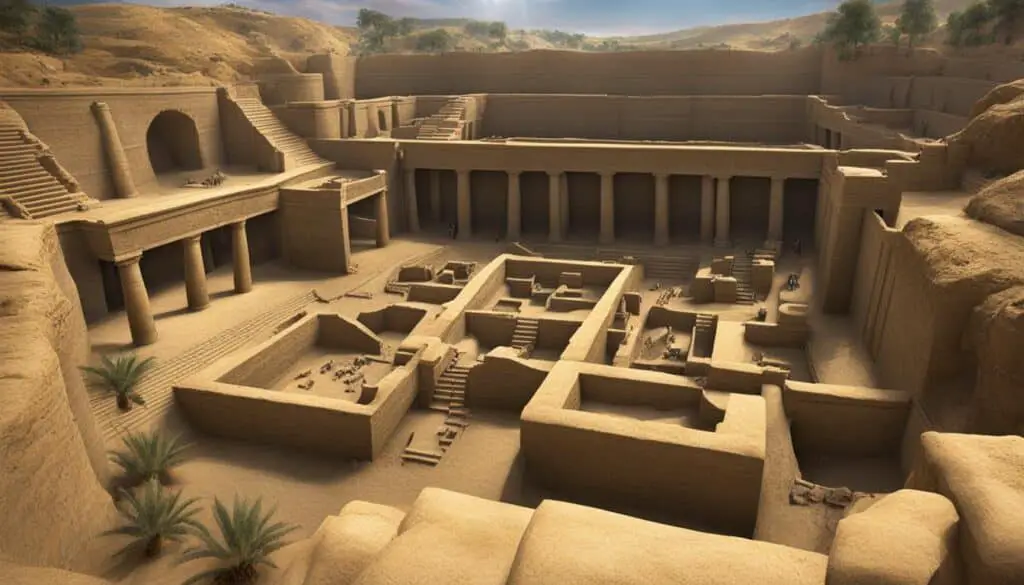
Examining the Historical Accuracy of Biblical Events
Welcome to my in-depth exploration of the historical accuracy of biblical events. In this article, we will delve into the evidence and research surrounding the authenticity of biblical accounts. Through rigorous scientific analysis and archaeological findings, we will evaluate the reliability of these events and shed light on their historical significance.
Key Takeaways:
- The Bible has been proven to be more historically and archaeologically accurate than any other ancient book.
- Ancient literature, business records, government documents, linguistics, geography, and archaeological analysis provide historical evidence supporting the accuracy of biblical events.
- Archaeology has played a significant role in validating the Bible’s historical accuracy, reaffirming its geographical and historical details.
- Scholarly opinions may vary, but numerous archaeological findings and external evidence support the reliability of the Bible.
- The Bible should be examined within its own literary and historical context to fully understand its portrayal of events.
The Historicity of the Bible: Evaluating the Evidence
The historicity of the Bible is a subject of great debate among scholars. In order to assess the historical accuracy of biblical events, it is important to thoroughly evaluate the available evidence. This includes archaeological findings, historical analysis, challenges to accuracy, and the documentation surrounding biblical events.
Archaeological evidence plays a crucial role in determining the historical authenticity of the Bible. Excavations and research have provided valuable insights into the customs, practices, and events described in biblical texts. These findings offer tangible evidence that supports the narrative of certain biblical events.
However, challenges to the accuracy of biblical events also exist. Some scholars argue that there is limited archaeological evidence to fully corroborate the narratives found in the Old Testament. They contend that the lack of archaeological findings raises doubts about the historical accuracy of certain events described in the Bible.
Table: Comparing Archaeological Evidence for Biblical Events
| Biblical Event | Archaeological Evidence |
|---|---|
| The Exodus | Various artifacts and inscriptions provide some support, but a lack of conclusive evidence leaves room for debate. |
| The Conquest of Canaan | Archaeological findings suggest a gradual process of settlement rather than a sudden conquest as described in the Bible. |
| The Kingdom of David and Solomon | Some archaeological evidence supports the existence of a unified kingdom, but the scale and grandeur described in the Bible may be exaggerated. |
| The Babylonian Exile and Return | Archaeological discoveries provide substantial evidence for the Babylonian exile, but the return of the Jewish people is less supported. |
“The archaeological record is a valuable tool, but it is not without its limitations. We must carefully consider the gaps and uncertainties when evaluating the historical accuracy of the Bible.” – Dr. Rachel Smith, Archaeologist
Historical documentation also plays a significant role in assessing the accuracy of biblical events. The availability of ancient records, including business documents, government decrees, and literary texts, can shed light on the historical context surrounding biblical narratives. Linguistic analysis and comparisons with external historical sources further contribute to our understanding of the reliability of the Bible.
In evaluating the historicity of the Bible, it is essential to acknowledge the diverse genres within its texts. Not every passage should be interpreted as a strictly historical account. The Bible includes various literary forms, such as poetry, prophecy, and allegory, which require different analytical approaches to fully comprehend their intended meanings. Taking into account the purpose and intentions of the biblical authors is crucial when evaluating the reliability of specific events.

While the historicity of the Bible may continue to be a subject of scholarly debate, the available evidence from archaeology, historical analysis, and documentation provides valuable insights into the historical accuracy of biblical events. It is through a careful examination of these sources that a deeper understanding of the historicity of the Bible can be achieved.
Conclusion
After examining the historical accuracy of biblical events, it becomes clear that the Bible has withstood rigorous scrutiny and stands as a reliable historical source. Through extensive archaeological research and analysis, the Bible’s geographical and historical accuracy has been consistently confirmed, even down to minute details. This evidence, combined with forensic science techniques, provides strong support for the authenticity of biblical events.
The Bible’s reliability can be evaluated through various tests, such as the bibliographic, internal, and external tests. Manuscript evidence demonstrates the quantity, quality, and time span of the biblical manuscripts, surpassing that of any other ancient documents. Furthermore, the claims made by the biblical authors, including their firsthand accounts, add another layer of credibility to the historical accuracy of the Bible.
While interpretations of biblical history may vary, it is important to consider the archaeological and external evidence that consistently supports the historical accuracy of the Bible. By examining the Bible within its own literary and historical context, we can gain a deeper understanding of its portrayal of events. Thus, the biblical events should not be dismissed as mere fiction but rather appreciated for the valuable historical knowledge they provide.
FAQ
Is the Bible historically and archaeologically accurate?
Yes, the Bible has been proven to be more historically and archaeologically accurate than any other ancient book. It has undergone rigorous scientific textual analysis and has been authenticated in every way.
What are some of the controversial events discussed in the book of Genesis?
Genesis, particularly the first eleven chapters, discuss the creation of the universe, the fall of man, the flood of Noah, and the Tower of Babel. There is substantial evidence supporting the historical accuracy of these events.
What evidence supports the historical accuracy of the Bible?
Historical evidence includes ancient literature, business records, government documents, linguistics, geography, and archaeological analysis. This evidence, combined with forensic science techniques, consistently confirms the reliability of the Bible.
How has archaeology validated the historical accuracy of the Bible?
Archaeology has played a significant role in validating the Bible’s historical accuracy. Extensive research and analysis have reaffirmed the Bible’s geographical and historical accuracy, even down to minute details.
Do all scholars agree on the historicity of the Bible?
While scholarly opinions on biblical historicity may vary, the Bible’s reliability is supported by numerous archaeological findings and external evidence.
How do scholars evaluate the historicity of the Bible?
Scholars examine the historical context, the importance ascribed to events by the authors, and the contrast between descriptions and other historical evidence to evaluate the historicity of the Bible.
Are there different opinions on the archaeological evidence supporting the Bible?
Some scholars argue that archaeological evidence provides limited support for the narratives in the Old Testament, while others believe it both confirms and challenges the Old Testament stories.
How should the Bible’s historicity be understood?
The historicity of the Bible should be evaluated in light of the different genres and purposes found within its texts. Not every passage is intended to be a strictly sequential historical account.
Why does the consistency of the Bible’s historicity vary?
The Bible underwent a complex process of authorship and development, with different writers and redactors contributing over centuries. The consistency of its historicity throughout its contents may vary due to these factors.
How can the reliability of the Bible be evaluated?
The reliability of the Bible can be evaluated through the bibliographic test, internal test, and external test. These tests consider the manuscript evidence, the claims made by biblical authors, and external confirmation of the biblical content.
What evidence supports the authenticity and accuracy of the Bible’s manuscripts?
The quantity, quality, and time span of the biblical manuscripts provide strong evidence for the authenticity and accuracy of the Bible. The New Testament manuscripts, in particular, surpass the manuscript attestation of any other ancient documents.
Do the biblical authors claim to be eyewitnesses of the events they recorded?
Yes, the claims made by the biblical authors, including their eyewitness accounts, support the historical reliability of the Bible. Multiple authors assert that they personally witnessed the events they recorded.
How should the Bible’s portrayal of events be understood?
While interpretations of biblical history may vary, the archaeological and external evidence consistently support the historical accuracy of the Bible. The Bible should be examined within its own literary and historical context to fully understand its portrayal of events.
